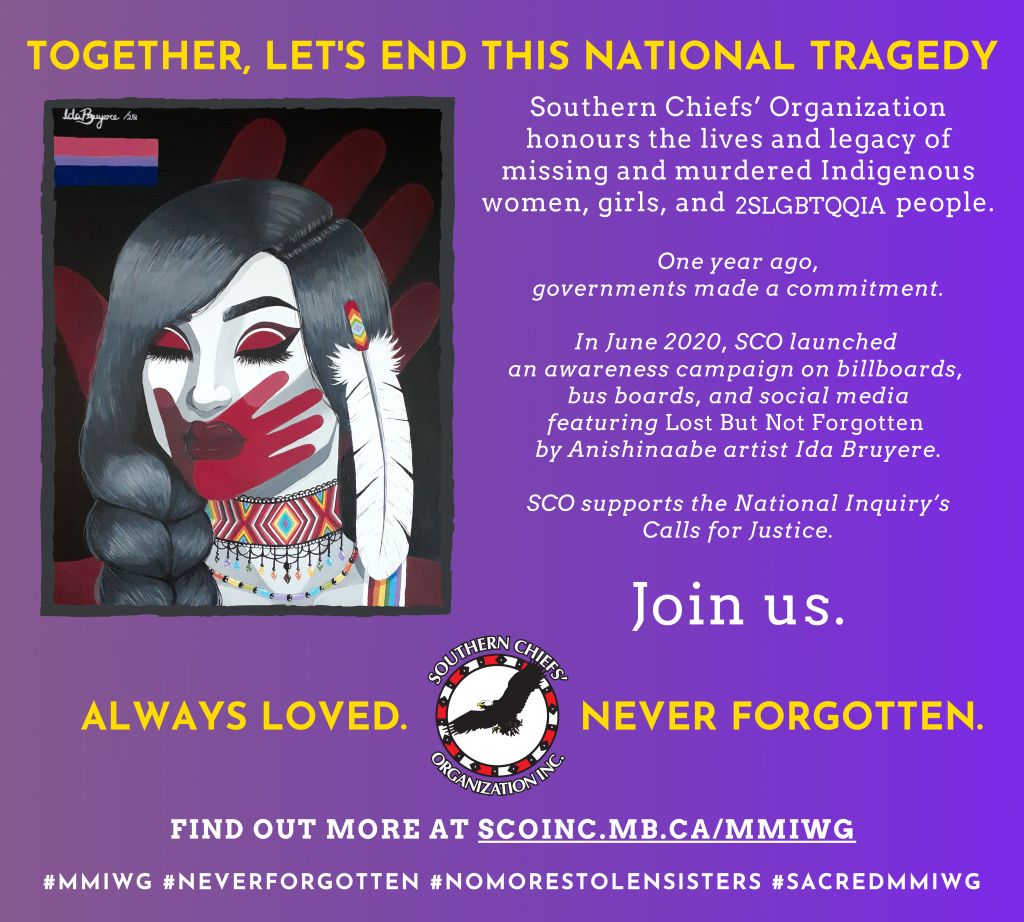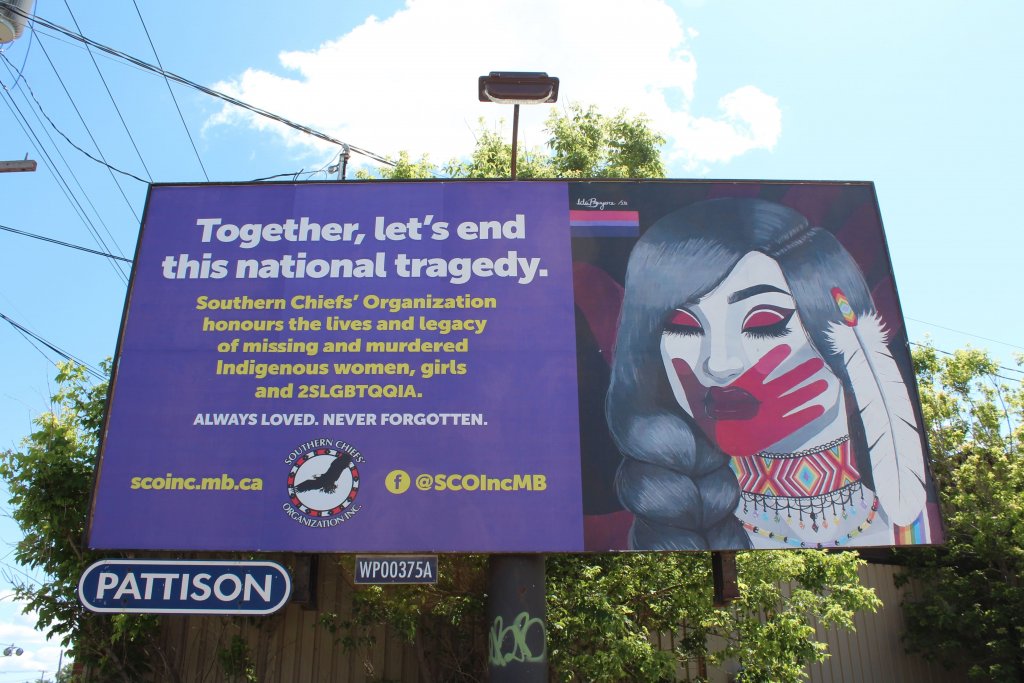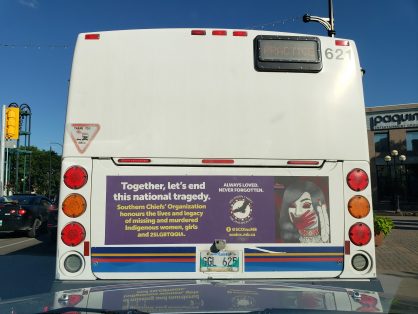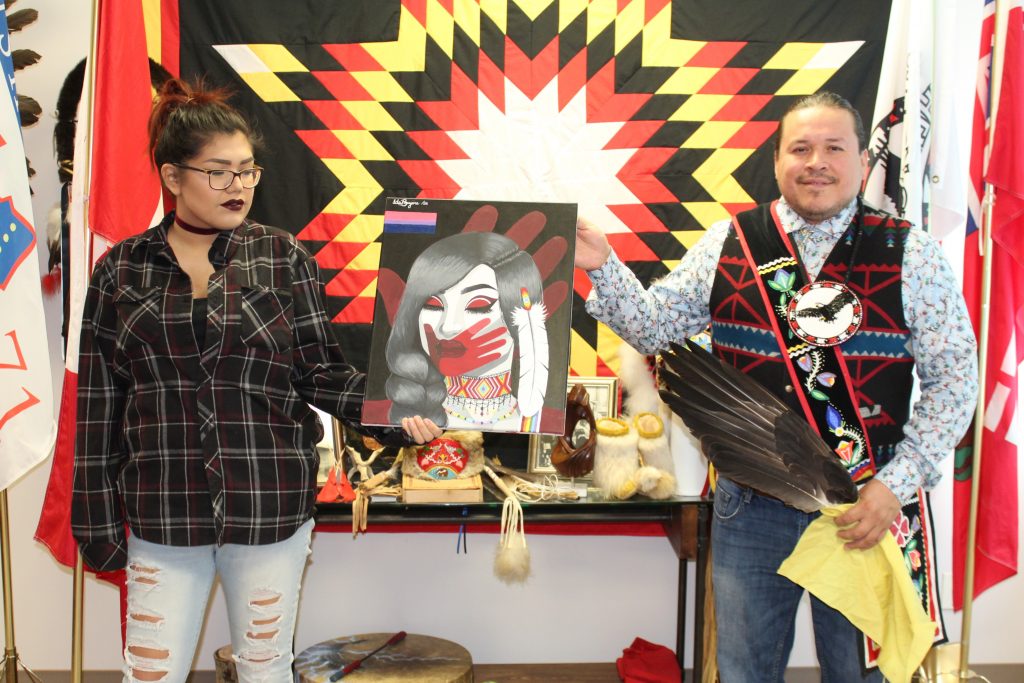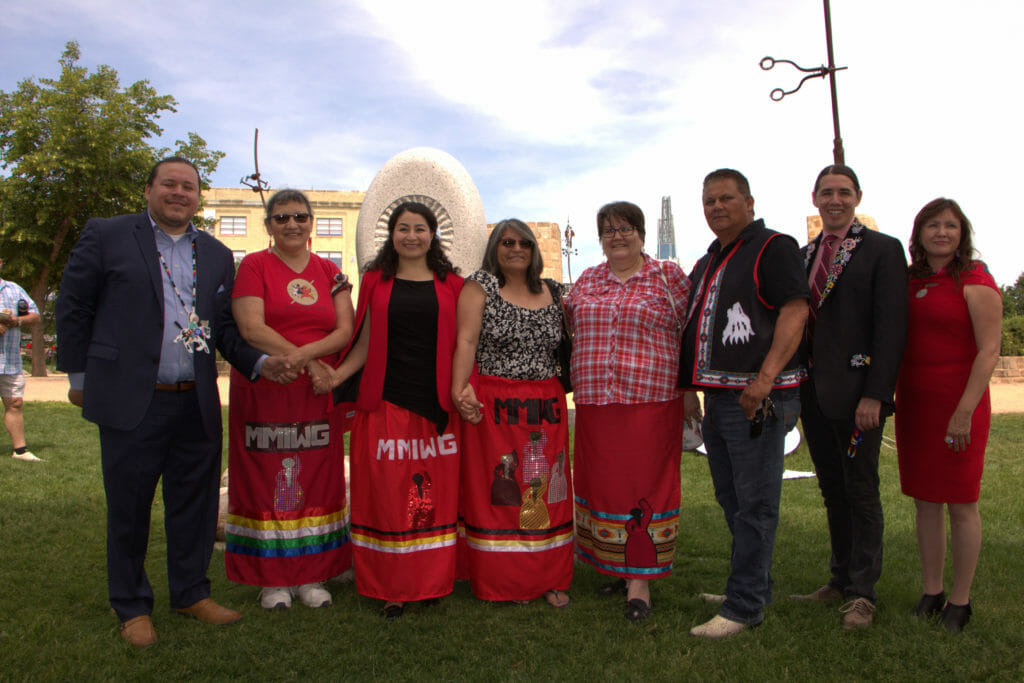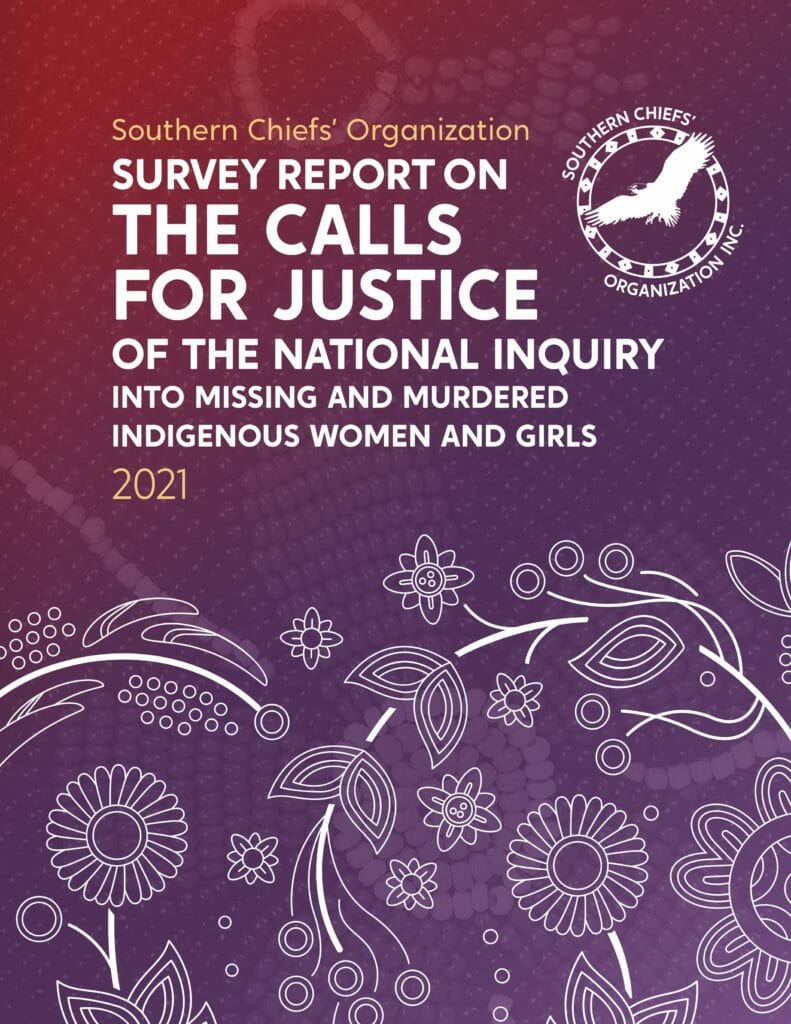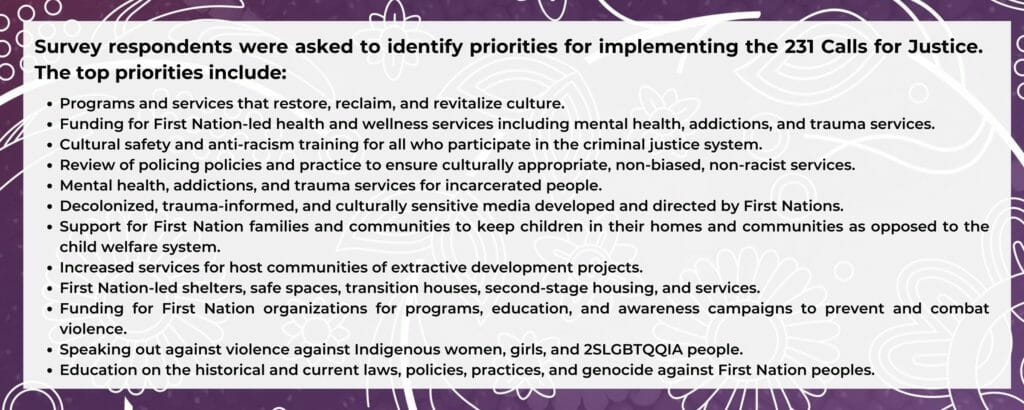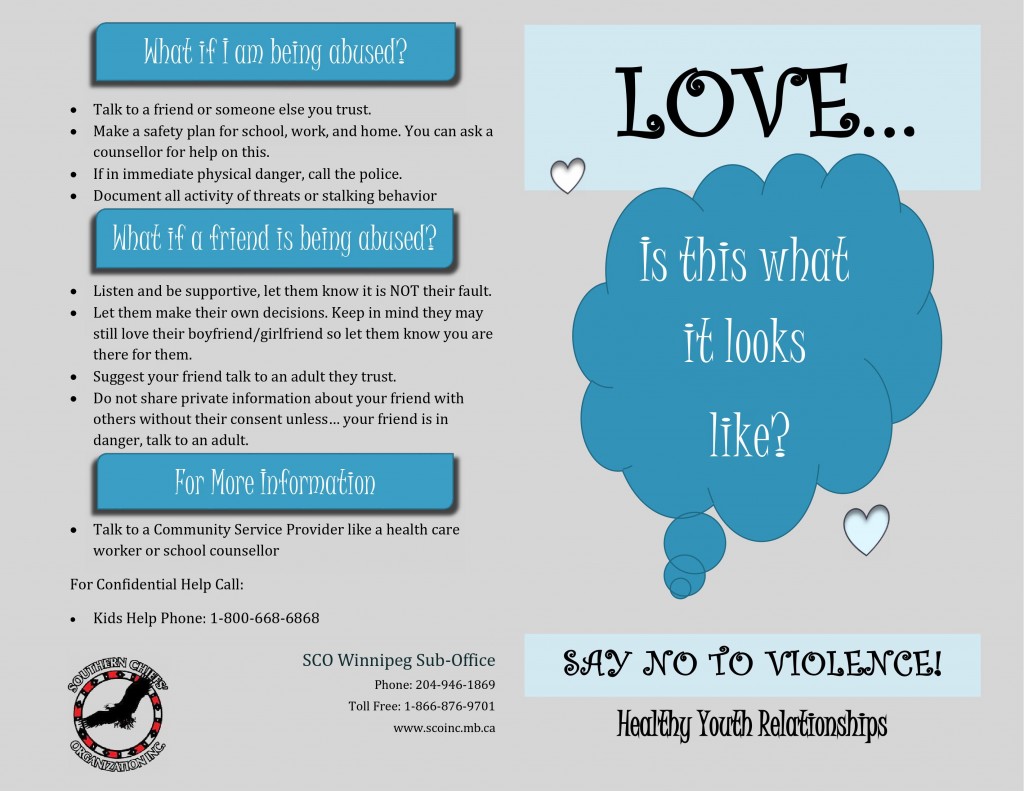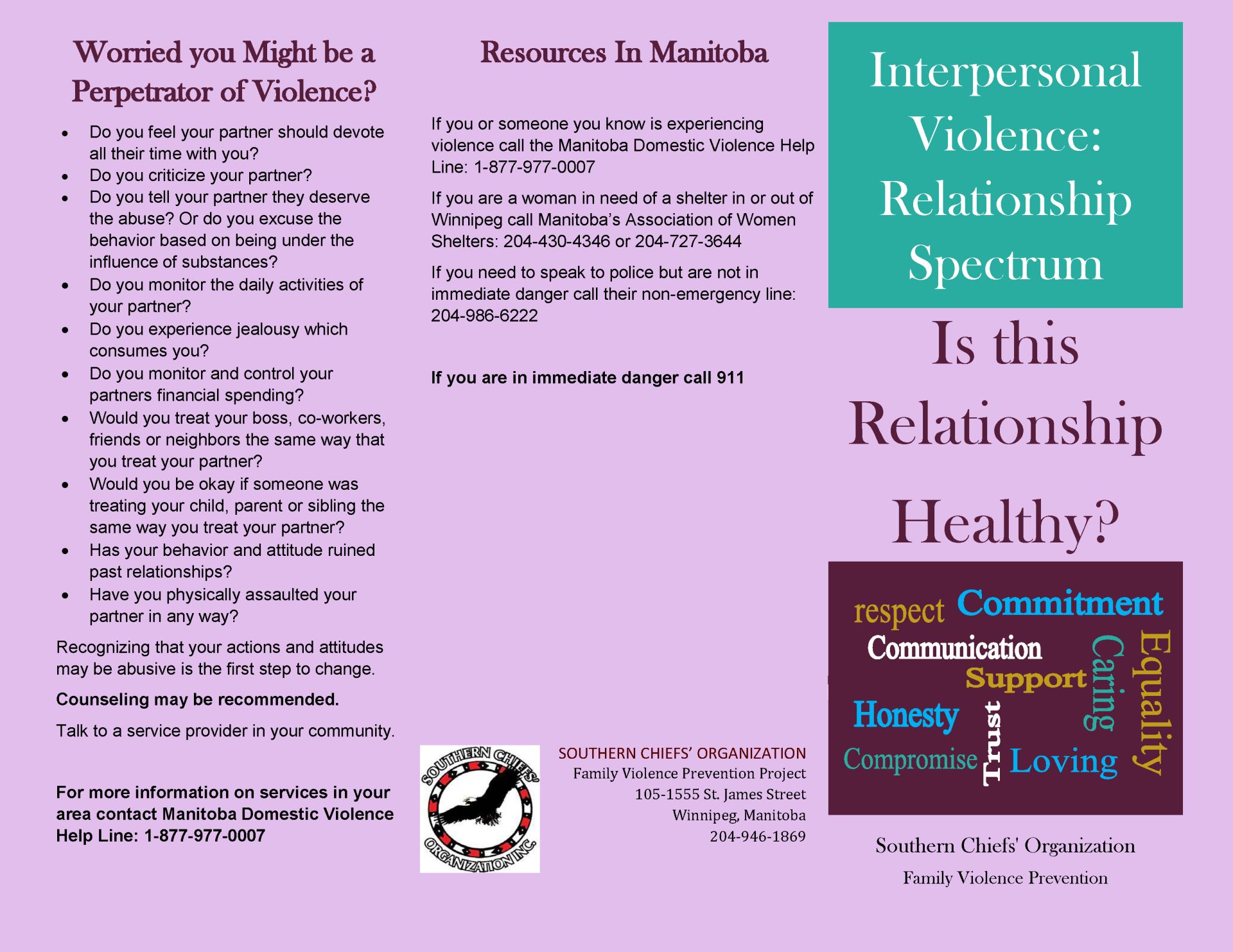If you require immediate emotional support, please call the national, independent toll free 24/7 support line at 1-844-413-6649 to speak to a counsellor. The service is available in English, Anishnaabemowin (Ojibway), Cree, Inuktitut, and French.
For confidential help and information on domestic violence, contact the province-wide, toll-free crisis line at 1-877-977-0007 (or text 204-792-5302 or 204-805-6682).
The Southern Chiefs’ Organization (SCO) recognizes all Indigenous women and girls are sacred. They are mothers, daughters, sisters, cousins, aunties, grandmothers, granddaughters, and leaders.
Traditionally and historically women were valued in their communities and society, yet today due to colonization, racism and gender discrimination, First Nation women disproportionately face tragic and life-threatening, gender-based violence.
SCO was a founding partner of the MMIWG Manitoba Coalition, and as a signatory to the Manitoba Coalition, SCO was a Party with Standing with the National Inquiry into Missing and Murdered Indigenous Women and Girls (MMIWG). SCO is also a founding partner of GAGANNAAWENIMAANAANIG, formerly known as the Manitoba MMIWG2S+ Implementation Committee, which is focused on implementing the 231 Calls for Justice.
Despite acknowledgement of an ongoing genocide, just two of the 231 Calls for Justice have been fully implemented, and more than half have not even been started. https://www.cbc.ca/newsinteractives/features/mother-sister-daughter
SCO wants to end this national state of emergency and we all have a role to play.
SCO Pathways to Healing Program
In September 2022, SCO launched the Pathways to Healing Program to support healing for those dealing with ongoing traumas associated with Indian Residential Schools, Indian Day Schools, the Sixties Scoop and child welfare system, and the issue of missing and murdered Indigenous women, girls, and gender diverse people.
Our liaisons are ready to assist and advocate for survivors and families interacting with various colonial systems, and to help in the coordination of gatherings while providing emotional support for Survivors and their families.
Contact pathwayshealing@scoinc.mb.ca or call 204-946-1869 or toll-free 1-866-876-9701 during regular office hours.
MMIWG2S+ Campaign
Every October 4, on the National Day of Action for MMIWG2S+, SCO launches a month long awareness campaign to draw the attention to the ongoing emergency of missing and murdered Indigenous women, girls, two spirit, and gender-diverse people, in what is now known as Canada.
As part of this campaign, SCO takes a multi-media approach with signage on billboards throughout southern Manitoba as well as transit signs in Winnipeg and Brandon, on SCO’s social media streams and web site. In response to community requests, Calls for Justice booklets, posters, vigil candles, t-shirts, and stickers are distributed throughout the month of October.
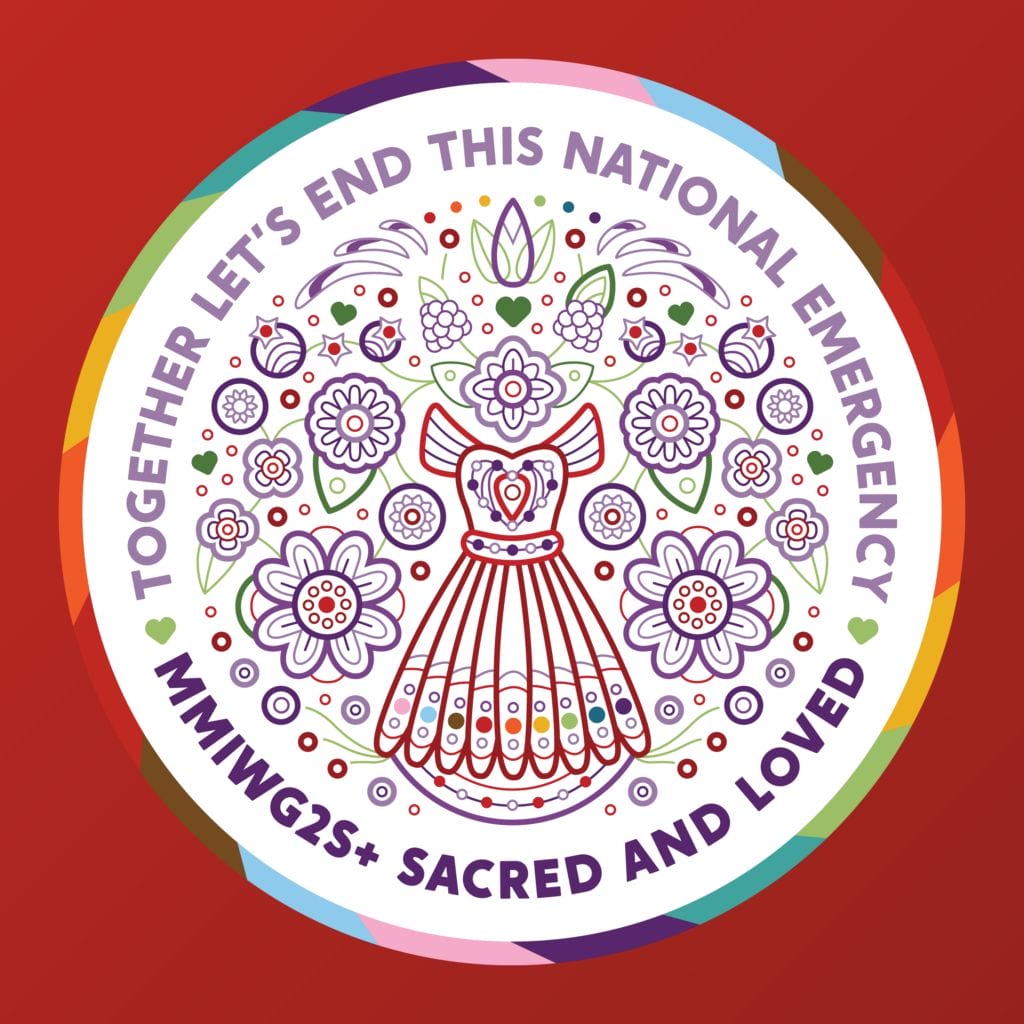
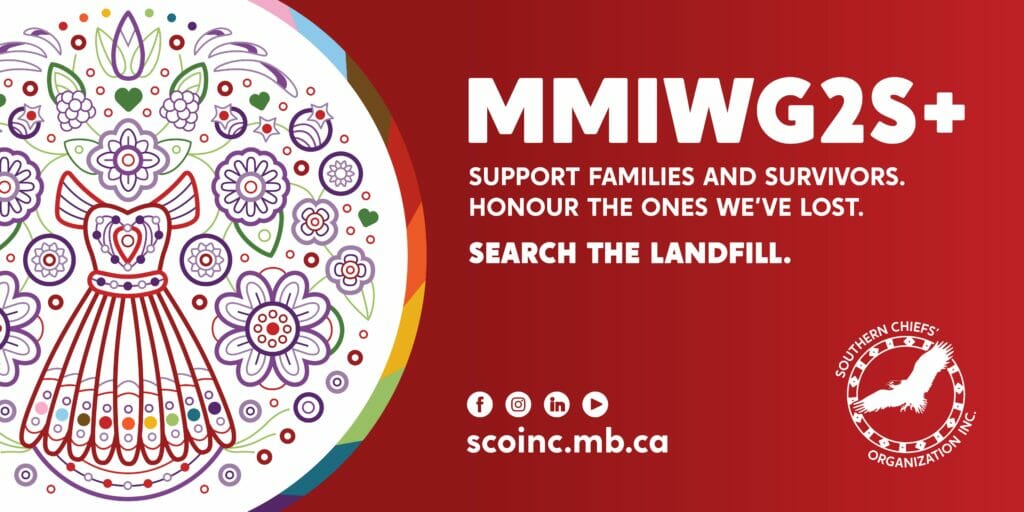
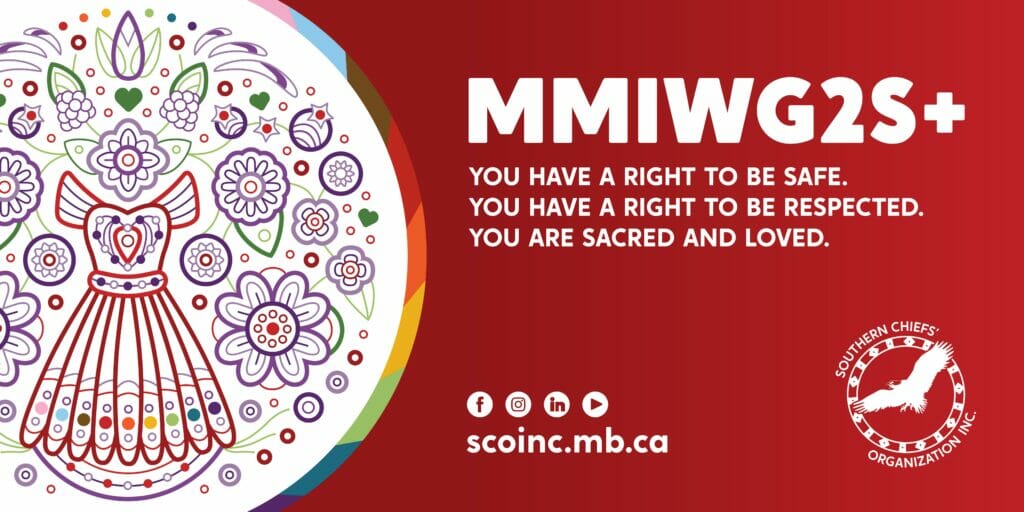
In 2023, we launched our third annual campaign, which includes the fact that every two days a woman is killed in Canada. This is a finding from the Canadian Femicide Observatory for Justice and Accountability, which found that in the five years since they started documenting women and girls being killed in Canada, at least 850 women and girls have lost their lives. This means that every 48 hours, one woman or girl is killed by violence. Every two days. And in fact this number, 850, is certainly much higher as it does not include women and girls if they have disappeared and their whereabouts are unknown.
National Inquiry’s Calls for Justice
At the request of Survivors and their families, Southern Chiefs’ Organization has created booklets of the National Inquiry’s Calls for Justice. If you would like a copy of the Calls for Justice, please drop by our Winnipeg sub-office at 1572 Dublin Avenue during office hours (Monday to Friday, 8:30 am – 4:30 pm except over the lunch hour 12 noon – 1 pm). If you live outside of Winnipeg and need a copy mailed to you, please call 204-946-1869 or toll free at 1-866-876-9701.
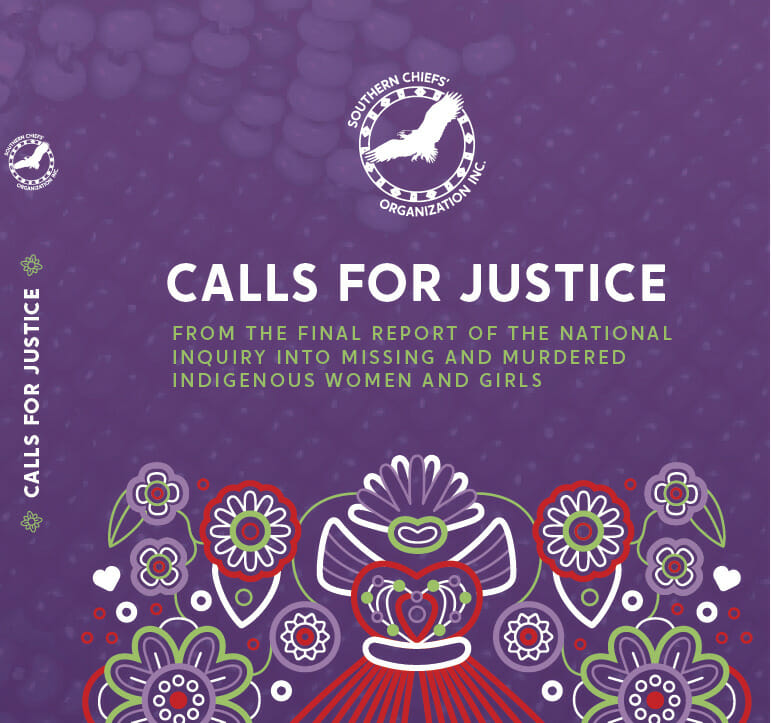
National Inquiry’s Calls for All Canadians
Each person has a role to play in order to combat violence against Indigenous women, girls, and 2SLGBTQQIA people. We encourage every Canadian to consider how they can give life to these Calls for Justice.
We call on all Canadians to:
15.1 Denounce and speak out against violence against Indigenous women, girls, and 2SLGBTQQIA people, in section 15 of the MMIWG National Inquiry’s Final Report:
15.2 Decolonize by learning the true history of Canada and Indigenous history in your local area. Learn about and celebrate Indigenous Peoples’ history, cultures, pride, and diversity, acknowledging the land you live on and its importance to local Indigenous communities, both historically and today.
15.3 Develop knowledge and read the Final Report. Listen to the truths shared, and acknowledge the burden of these human and Indigenous rights violations, and how they impact Indigenous women, girls, and 2SLGBTQQIA people today.
15.4 Using what you have learned and some of the resources suggested, become a strong ally. Being a strong ally involves more than just tolerance; it means actively working to break down barriers and to support others in every relationship and encounter in which you participate.
15.5 Confront and speak out against racism, sexism, ignorance, homophobia, and transphobia, and teach or encourage others to do the same, wherever it occurs: in your home, in your workplace, or in social settings.
15.6 Protect, support, and promote the safety of women, girls, and 2SLGBTQQIA people by acknowledging and respecting the value of every person and every community, as well as the right of Indigenous women, girls, and 2SLGBTQQIA people to generate their own, self-determined solutions.
15.7 Create time and space for relationships based on respect as human beings, supporting and embracing differences with kindness, love, and respect. Learn about Indigenous principles of relationship specific to those Nations or communities in your local area and work, and put them into practice in all of your relationships with Indigenous Peoples.
15.8 Help hold all governments accountable to act on the Calls for Justice, and to implement them according to the important principles we set out.
Click here for a .pdf of the Final Report’s Calls for Justice for All Canadians.
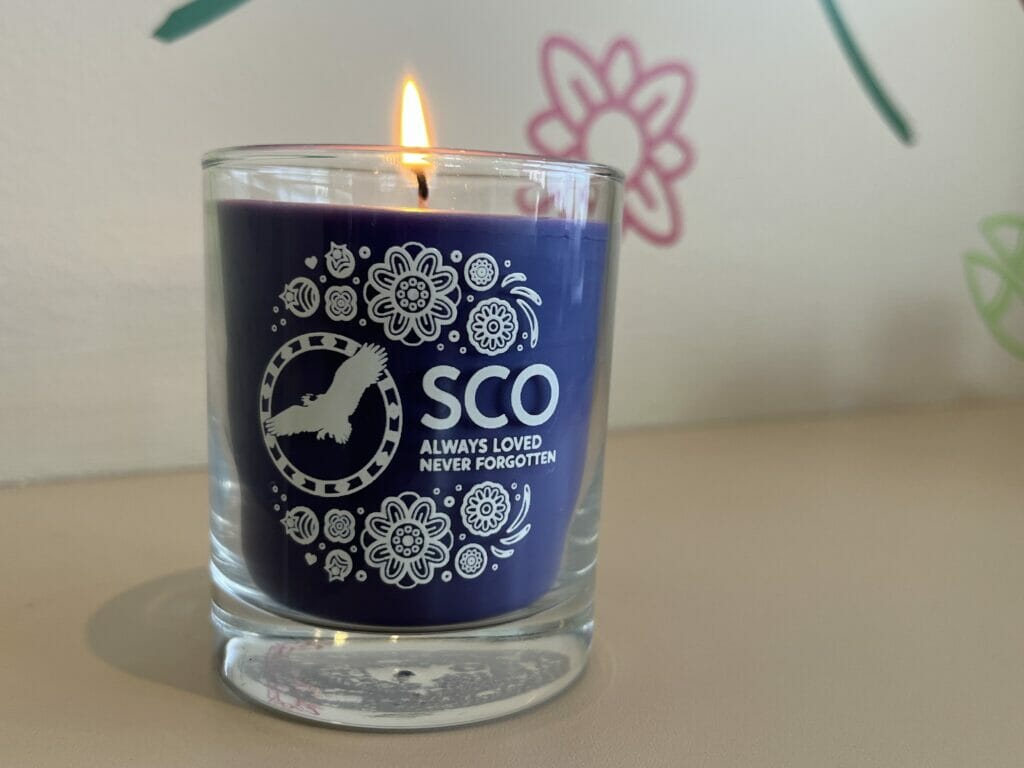
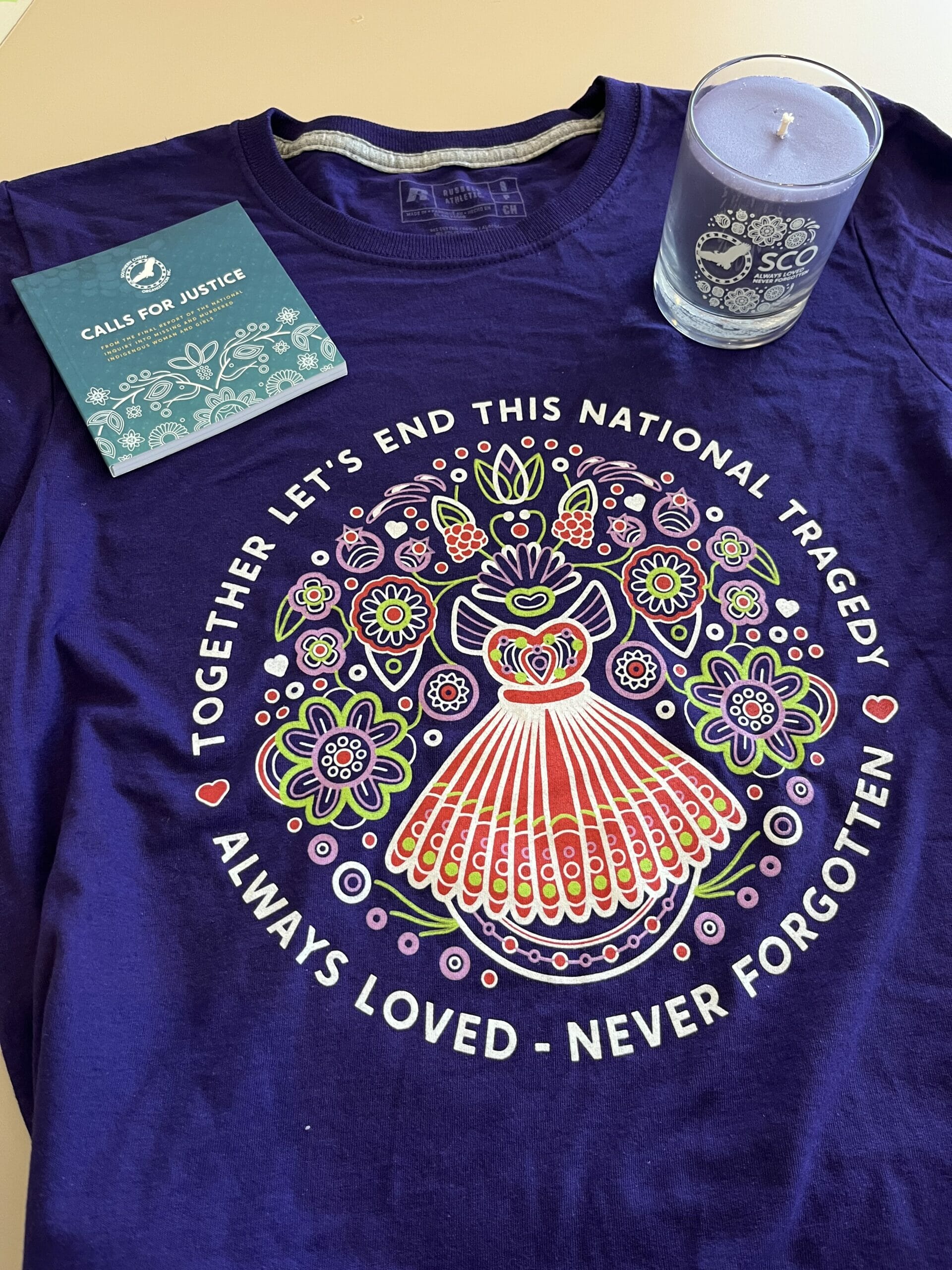
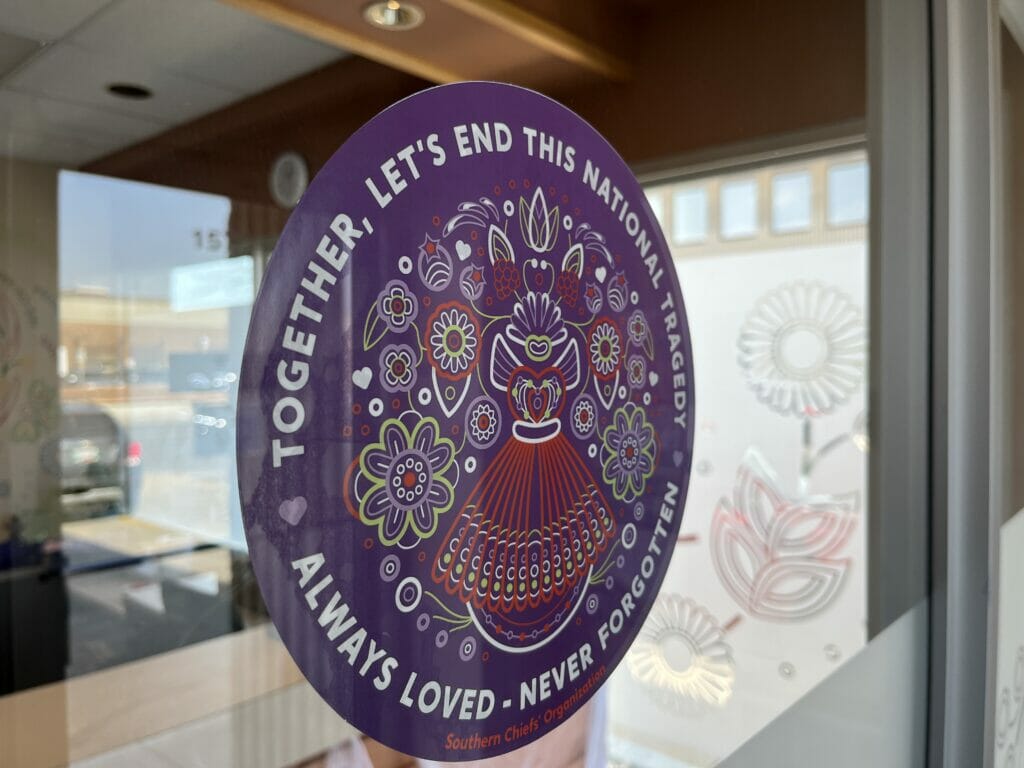

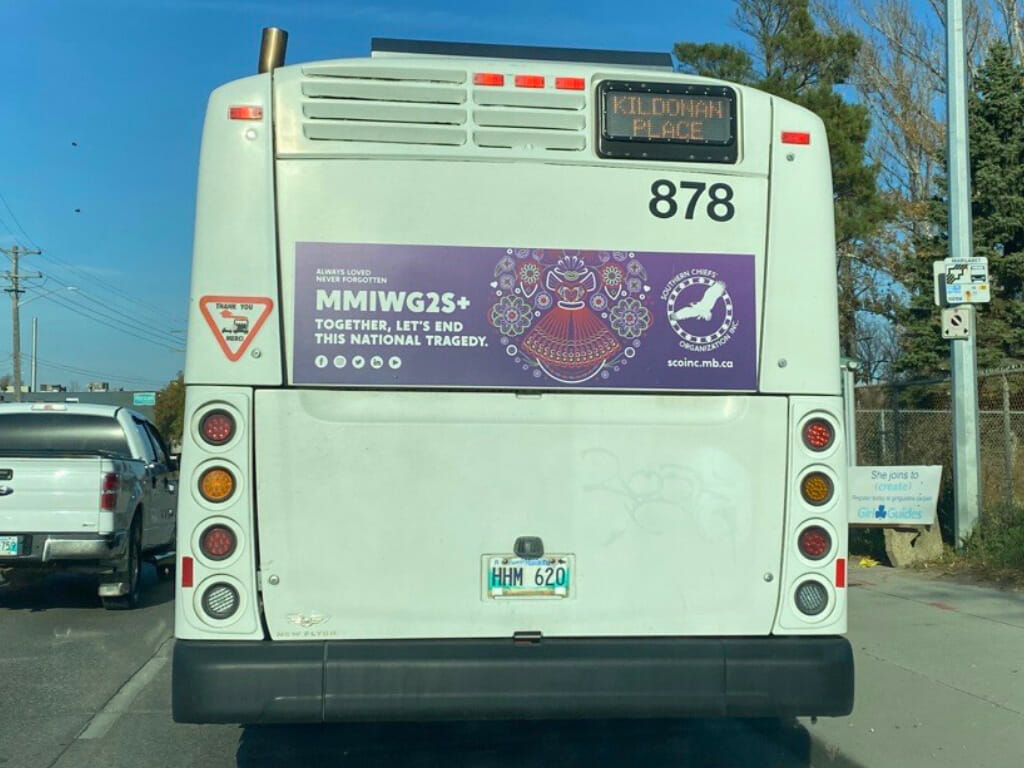
2020 Campaign
In June of 2020, on the one-year anniversary of the historic National Inquiry and the release of the final report and Calls for Justice (PDF), the Southern Chiefs’ Organization launched a public awareness campaign. The campaign, featured on billboards, bus boards and social media, featured the work of then 18 year-old Winnipeg artist Ida Bruyere, a proud citizen of Black River First Nation with family ties to Sagkeeng First Nation. Her painting, Lost But Not Forgotten, gives voice to the tragedy of missing and murdered women, girls and 2SLGBTQQIA people and calls for a new future.
Bruyere’s painting was selected as the winning submission from a call for artistic expressions early in 2020. The goal of the campaign was to raise awareness of the systems and structures that put Indigenous women, girls, and 2SLGBTQQIA people so disproportionately at risk. The powerful image Bruyere created honours the lives and legacy of missing and murdered Indigenous women, girls, and 2SLGBTQQIA people, and the campaign invited all Canadians to come together and join us.
Survey Report on the Calls for Justice
On October 4, 2021, the National Day of Action for MMIWG, SCO released the powerful results of the ‘Survey Report on the Calls for Justice of the National Inquiry into Missing and Murdered Indigenous Women and Girls’. The survey was launched on May 5, 2021, the National Day of Awareness of MMIWG, to identify southern First Nations’ priorities around the National Inquiry’s 231 Calls for Justice.
SCO Grand Chief Jerry Daniels
Firstly, I want to share my deepest sympathies and condolences to all victims of MMIWG2S+ and their loved ones. We are tired of waiting for colonial governments and institutions to take action. At SCO, we pressed forward, surveying southern First Nation citizens to better understand what they want and need in terms of action to end the national epidemic of violence against our women, girls, and 2SLGBTQQIA+ people. The results, while heartbreaking, are illuminating and give us the direction we need to advocate for change and to seek justice for the victims and their families.
Survey Responses
The anonymous survey was open to all SCO community members and one of the first questions was about respondents’ relationship to the issue of MMIWG2S+. An overwhelming majority of survey respondents, over 79 per cent, answered that they were related to, or a friend of, a missing or murdered Indigenous woman, girl, or person. These numbers demonstrate how close this issue is to many survey participants.
Respondents shared why the issue of MMIWG2S+ is important to them, and their personal experiences came through in the comments:
I have two daughters and now two granddaughters that I constantly worry about, I have a friend whose daughter has been missing for a little over a year now […], another friend who’s sister was murdered by her partner, I could go on and on. Society needs to start shifting their views of women, girls and 2SLGBTQ+ people, and stop treating us like we are disposable, we are equal and need to be treated as such!
Pine Creek First Nation
(It is important) Because it is indicative of systemic racism and a crisis for our women. If these were white and mainstream women, the systemic response would be very different.
Sandy Bay First Nation
Respondents were asked at the end to focus on the Calls for Justice aimed at actions all Canadians can take to end the violence against Indigenous women, girls, and 2SLGBTQQIA people. Less than half of the respondents reported seeing any progress on any of the actions to be taken since the release of the Calls for Justice two years ago.
Lastly, survey respondents were able to provide additional comments and reflections. Their comments bring to light the importance of the Calls for Justice and the need for Indigenous women, girls, and gender diverse peoples to be heard and respected:
Indigenous women matter. That we need to be seen, heard, and equally treated as non-Indigenous women. That we need protection from predators, killers, and rapists. That our lives matter. That our existence depends on uplifting and empowering Indigenous women and their families.
Pinaymootang First Nation
I’ve had days where I couldn’t find my sister and had no idea where to start looking. The police were no help, they came and tried to aggravate me and my mom. They made themselves out to be the victims, they started going off about “Defund the police” when nobody brought it up but them.
Black River First Nation
You can read the full survey results here, and they will be used to strengthen advocacy on behalf of First Nation women, girls, and 2SLGBTQQIA people, including as input to Canada’s National Action Plan. It is important work that community members endorse and support, and as one participant expressed: “Keep pushing and fighting hard for our rights and for the voiceless” (Pinaymootang First Nation).
Resources
Crisis Phone Lines
Toll-Free Province Wide Domestic Abuse Crisis Line (24 hours): 1-877-977-0007
Victim Services: 204-945-6851
Klinic Crisis Line: 204-786-8686 / 1-888-322-3019
Klinic Sexual Assault Crisis Line: 204-786-8631
Sexual Assault Crisis Line: 1-888-292-7565
Mobile Crisis Services: 204-940-1781 (General) or 204-949-4777 (Youth)
Manitoba Suicide Prevention and Support Line: 1-877-435-7170
Shelters
Crisis Line (TEXT ONLY): 204-792-5302
Phone: 204-615-0313
Emergency: 204-615-0311
Email: reception@willowplace.ca
Dauphin, MB – Parkland Crisis Centre Inc
Phone: 204-622-4626
Emergency: 204-638-9484
Email: pkndcris@mymts.net
Koostatak / Fisher River,MB – First Nation Healing Centre
Phone: 204-645-2750 (24 hours)
Toll-free: 1-800-692-6270
Portage la Prairie, MB – Portage Family Abuse Prevention Centre Inc
Phone: 204-239-5234
Emergency: 204-239-5233
Email: director@abuseprevention.ca
Phone: 204-482-7882
Emergency: 204-482-1200
Texting Crisis Line: 204-805-6682
Email: info@novahouse.ca
Steinbach, MB – Agape House Women’s Shelter; Eastman Crisis Centre Inc
Phone: 204-326-6062
Emergency: 204-346-0028
Email: admin@agapehouse.ca
Winkler, MB – Genesis House: South Central Committee on Family Violence Inc
Phone: 204-325-9957
Emergency: 204-325-9800
Email: sccfv@genesis-house.ca
Where can I go for immediate support?
If you require immediate support, please contact the national, independent toll free 24/7 support line at 1-844-413-6649 to speak to a counsellor. The service is available in English, Anishnaabemowin (Ojibway), Cree, Inuktitut, and French.
For confidential help and information on domestic violence, call the province-wide, toll-free crisis line at 1-877-977-0007 (or text 204-792-5302 or 204-805-6682).
If you are impacted by the issue of violence and of missing and murdered Indigenous women, girls and 2SLGBTQQIA, Indigenous Services Canada (ISC) covers counselling and cultural support services. More information is available at the ISC Services Page.
What support services qualify?
Cultural Supports are provided by local Indigenous organizations that coordinate the services of Elders, traditional healers, and/or Indigenous community-based workers. Cultural supports will listen, talk, provide support, and can provide specific services chosen by the individual such as traditional healing, ceremonies, teachings and dialogue.
Counselling is provided by psychologists and social workers that enroll with Indigenous Services Canada. They will listen, talk, and assists individuals to provide support and find ways of healing.
Transportation assistance may be offered when professional counselling and cultural support services are not locally available.
Where can I go for help?
If you have questions about missing and murdered loved ones, Family Information Liaison Unit (FILU) members work directly with families to gather information from government services and agencies, such as child protection, polices services and coroner’s offices, to address outstanding questions about the loss of their loved ones. For more information about the services they offer or to find a contact near you, visit the FILU webpage on the Department of Justice website.
The Family Information Liaison Unit lead for Southern Manitoba is
Medicine Bear Counselling, Support & Elder Services
Ka Ni Kanichihk Inc.-“Those who lead”
Community Family Liaison Contact
Phone: 204-594-6500 ext. 109
Toll free: 1-888-953-5264
Fax: 204-219-6902
Website: www.kanikanichihk.ca
For mental wellness resources available in southern Manitoba, visit our Mental Wellness Page.
Violence against women is typically perpetrated by men, and many of them lack the proper support to break the cycle of violence, which stems from centuries of colonization. Men can also be victims of domestic violence and in need of victim services and support. Ending Violence Across Manitoba has a list of services and programs available across the province for men who are victims and for men who have committed domestic violence and looking for help on how to end violent patterns.
Local Emergency Services and Help Lines
If experiencing a life‐threatening crisis, please contact your local emergency services (911) or RCMP detachment.
Hope For Wellness
Toll Free Prevention and Support Line:
1-877‐435-7170
Toll Free Hope for Wellness Help Line:
1‐855-242-3310
Online chat available at hopeforwellness.ca
Gi-wii-gaagiigid na? Michi-giigidon. Ganoosh awiya omaa Anishinaabeg gaye Eshkiimeg Bagosendamowin Ji-ayaamagak Mino-ayaawin Izhi-Giigidowin 1-855-242-3310.
Kids Help Phone
Professional counselling, information, referrals, and volunteer-led text-based support for children and youth are available at https://kidshelpphone.ca/.
Other Resources
Protecting Our Women Safety Plan & Toolkits
Southern Chiefs’ Organization completed a three year project titled, Protecting Our Women. The main goal of this project was to work with the southern First Nations and community stakeholders in the City of Winnipeg to develop a community Safety Plan and Toolkit for Indigenous women and girls moving to or residing in Winnipeg.
We are proud to share the Safety Plan and Toolkit which includes four booklets below.
- A Toolkit for Women and Girls Transitioning to Winnipeg (PDF)
- A Toolkit for Women Leaving Incarceration (PDF)
- A Toolkit for Youth Transitioning to Winnipeg (PDF)
- Resource Guide for Women and Girls (PDF)
Please contact us if you have any questions or comments.
Other Supports:
Family Violence Shelters and Supports (PDF)
Ka Ni Kanichihk
Missing Persons and Persons at Risk Toolkit
Medicine Bear Counselling, Support & Elder Services Program
Ma Mawi Wi Chi Itata Centre
Suggested Resources for Learning
National Inquiry into Missing and Murdered Indigenous Women and Girls: Reclaiming Power and Place: The Final Report of the National Inquiry into Missing and Murdered Women and Girls.
National Inquiry into Missing and Murdered Indigenous Women and Girls: Their Voices Will Guide Us: Student and Youth Engagement Guide.
Transcripts, testimonies, and public statements offered during the Truth-Gathering Process, available at www.mmiwg-ffada.ca/transcripts/ and http://www.mmiwgffada.ca/part-ii-and-part-iii-knowledge-keeper-expert-and-institutional-hearing-transcripts/.
16 Actions Against Gender-Based Violence
Suggested Resources for Allyship
Amnesty International: “10 Ways to Be a Genuine Ally to Indigenous Communities.”
Dr. Lynn Gehl: “Ally Bill of Responsibilities (PDF).”
Indigenous Perspectives Society: “How to Be an Ally to Indigenous People.”


